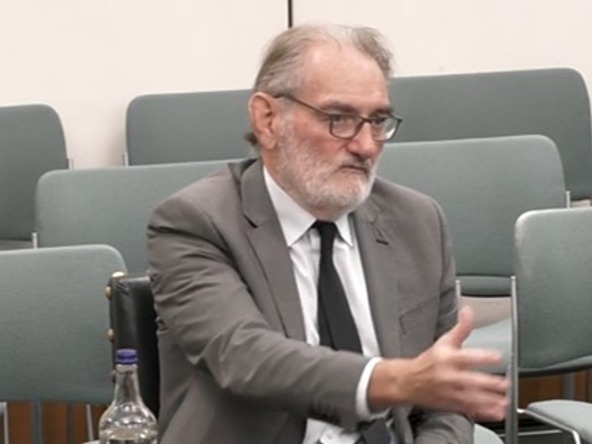More funding needed for ONS, former national statistician tells MPs

Speaking at a session of the Public Administration and Constitutional Affairs Committee on Tuesday 9th September, which was examining recent issues with ONS economic statistics as part of a broader investigation into the performance and governance of the UK Statistics Authority, Diamond said that there needed to be a recognition that for the ONS to carry out all of the tasks expected of it, there needed to be more money made available.
Diamond said: “Do I believe there needs to be greater skills in data coding? Yes. Do I believe that a national statistics institute trying to deliver what it is trying to deliver is underfunded? 100%.
“This [statistics] is driving an enormous economy and the amounts of money are really quite small, and we should have a really strong field force, we should have the ability to get the right people in. I don’t think the funding allows that to happen.”
Diamond, who resigned as national statistician earlier this year due to ongoing health issues, added that there needed to be a broader interpretation of the work of the ONS beyond economic statistics.
“We are a national statistics institute, and in my opinion that is different to an economic statistics institute,” Diamond told MPs. “While there is much discussion about getting the economic statistics right, which is incredibly important, I do think that a national statistics institute should be doing more. In order to do that, it needs to be properly funded.”
He added: “I would argue that a national statistics institute should be doing social statistics as well as economic statistics – the two are, in my opinion, equally important – then you need the funding to do that.”
The comments come after a challenging year for ONS, which has included the conclusion of an independent review into the performance and culture of the ONS, carried out by Sir Robert Devereux KCB, which highlighted weaknesses with the ONS’s work culture, focus on core work and allocation of funding.
In response to the review, the ONS had said that it recognised that key economic statistics “have not met users’ expectations on quality and trustworthiness” and set out two plans to address issues raised in the independent review, including making improvements in data collection and statistical production and fixing underlying resourcing issues.
Diamond touched on issues with the survey on business enterprise research and development and the ONS’s labour force statistics, highlighting long-standing issues with how the two streams of research had been run, but said changes had been made to correct issues and that “some of those errors could have been there for 10 years”.
He added that there needs to be a greater focus on administrative data in the compiling of national statistics.
“There really needs to be a thinking through of the role of social and business surveys in national statistics,” Diamond said in the committee hearing.
“That does not mean to say for a minute that we stop doing surveys – there are things we can only get by asking people or asking companies, and I have said that right from the beginning. But we also need to recognise that people are busy, people need and want to answer questions when they want to do it in a way they wish to do it. The future has to be linking of administrative data and survey data.”
Diamond was asked by committee chair Simon Hoare if the ONS had gone “to hell in a handcart” in recent years, and Diamond admitted that recent issues with statistics produced by the ONS had seen the reputation of the organisation take a “major hit”, but said that changes were being made to address the issues.
“I fully recognise that the reputation of the ONS has had a major hit. I feel very sorry for the thousands of really dedicated public servants who work there who are doing great things.
“Do I believe that the organisation has, to use your words, gone to ‘hell in a handcart’? I don’t believe that. Do I believe there are serious challenges? Yes I do. Do I believe those serious challenges have been there for some time, and by some time I mean very much into the past decade? Then yes, there are many challenges?”
Diamond was also told by Hoare that information sent to him from current staff at the ONS suggested that they are “demoralised and browbeaten, most saying they had tried to raise issues and concerns, but the culture of the organisation neither encouraged nor allowed”, and that the hiring and firing of colleagues “could at best be described as haphazard, if not chaotic”.
In response, Diamond accepted that senior colleagues “felt disenfranchised” and said that he had held open meetings about the issues.
Diamond added that it was clear that “people didn’t feel that if they said anything that it would necessarily be listened to”, and that changes to the ONS culture he had tried to instil had not always been successful.
“I do feel that while one person can set the culture for an institution and try very hard to make that culture happen, it is for everyone in the institution to take that forward,” he said. “I am not entirely clear that we always had that cascade through as much as I would have liked.”
Diamond concluded: “Do I believe that, all on my own, I have caused the demise of the reputation of the ONS? No I don’t. I am owning it, and I am not in any way trying to hide from it. But is it just down to me? No.”

We hope you enjoyed this article.
Research Live is published by MRS.
The Market Research Society (MRS) exists to promote and protect the research sector, showcasing how research delivers impact for businesses and government.
Members of MRS enjoy many benefits including tailoured policy guidance, discounts on training and conferences, and access to member-only content.
For example, there's an archive of winning case studies from over a decade of MRS Awards.
Find out more about the benefits of joining MRS here.













0 Comments